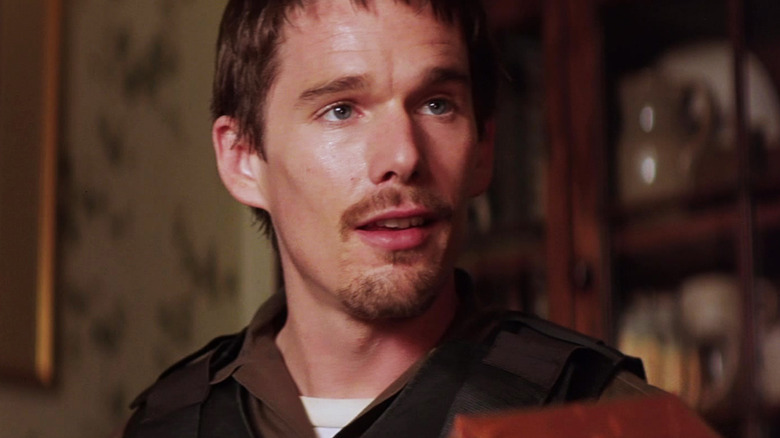
Ethan Hawke’s Strategic Approach to “Training Day”
Ethan Hawke’s performance in Antoine Fuqua’s 2001 crime thriller “Training Day” remains one of the most underappreciated yet impactful roles in his career. While Denzel Washington’s portrayal of the corrupt, charismatic LAPD detective Alonzo Harris stole the spotlight, Hawke’s role as rookie cop Jake Hoyt was critical to the film’s success. Rather than trying to match Washington’s magnetic presence, Hawke took a different approach, focusing on being an effective scene partner and allowing Washington to shine. This strategy not only enhanced the dynamic between the two characters but also contributed to one of the most memorable performances in Washington’s illustrious career.
Studying the Best Scene Partners
Hawke’s preparation for “Training Day” involved more than just memorizing lines or understanding his character. He spent time analyzing how Washington had interacted with other actors in previous films, looking for examples of strong scene partners who could elevate his co-star’s performance. This methodical approach helped him understand the balance needed to support Washington without overshadowing him.
In a 2025 interview with Rolling Stone, Hawke explained that he wasn’t focused on holding his own against Washington but rather on finding the right way to complement his co-star. “It was less about ‘how can I hold my own against him?’ and more like, ‘who excelled at being a really good scene partner for him?’” he said. After reading the script, Hawke realized that his job was to simply do his part well enough to let Washington deliver his Oscar-winning performance.
A Lesson from Gene Hackman
One of the key influences on Hawke’s approach was his admiration for Gene Hackman’s performance in the 1995 film “Crimson Tide.” In that movie, Hackman played a commanding officer who engaged in intense debates with Denzel Washington’s executive officer, creating a powerful dynamic that showcased both actors’ strengths. Hawke saw this as a model for his own work in “Training Day.”
“I kept thinking of Gene Hackman,” Hawke said. “You watch a lot of Denzel’s movies, and you see people getting out of his way. Then you watch ‘Crimson Tide,’ and those guys are just going toe to toe. Neither of them are getting out of each other’s way.” For Hawke, the goal was to be a “Gene Hackman-level scene partner,” which meant giving Washington something to react to while maintaining the integrity of his own character.
The Importance of Subtlety
Hawke understood that “Training Day” was fundamentally about Denzel Washington. His role as Jake Hoyt required a subtle, grounded performance that would allow Washington’s larger-than-life character to take center stage. By doing so, Hawke helped create a believable contrast between the experienced, morally ambiguous Alonzo and the inexperienced, idealistic Jake.
This balance was crucial to the film’s success. If Hawke had tried to match Washington’s intensity, it might have disrupted the dynamic between the characters. Instead, he focused on making Jake as real and three-dimensional as possible, allowing Washington to fully embody Alonzo.
A Memorable Experience
Hawke described his time on set as one of the most memorable experiences of his career. “There's a handful of experiences I've had where I can remember every day, every minute of being on set,” he said. “This was one of them. It's like I was playing on a team with nothing but Hall-of-Famers on it.”
Despite being overshadowed by Washington’s performance, Hawke remained proud of his work in “Training Day.” He compared his role to that of Scottie Pippen in “Space Jam,” noting that while Pippen’s performance was often overlooked, it was essential to the overall success of the film.
A Legacy of Collaboration
“Training Day” marked a turning point in Denzel Washington’s career, solidifying his status as one of Hollywood’s most versatile actors. For Ethan Hawke, it was an opportunity to work alongside a legend and learn from his approach. By focusing on collaboration rather than competition, Hawke helped create a film that remains a standout in both their careers.

Post a Comment